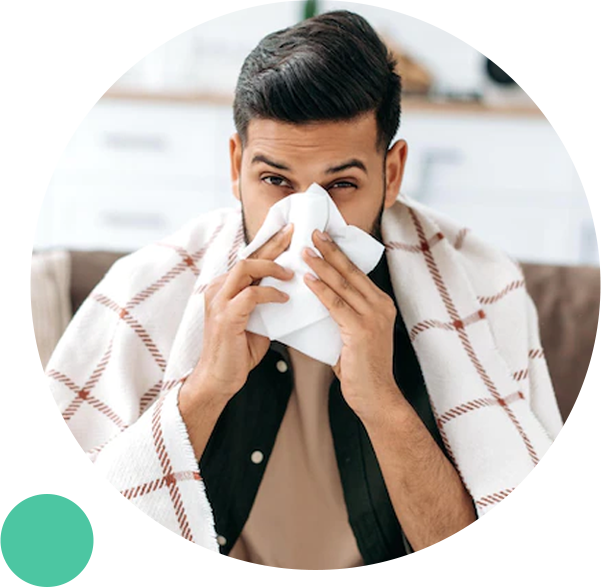Consult an Online Doctor
For Sinus
Infection (Sinusitis)
Every year, around 30 million individuals are diagnosed with sinus infections between the fall and spring seasons. While the severity of the condition is no cause for alarm, prolonged symptoms can make you highly irritable.

Consult an Online Doctor
For Allergies
Every year, around 30 million individuals are diagnosed with sinus infections between the fall and spring seasons. While the severity of the condition is no cause for alarm, prolonged symptoms can make you highly irritable.

TELMDCARE
Is Prevention Really
Better than Cure?
A robust immune system can protect you against a sinus infection, especially during winter. Our family care doctors recommend drinking lots of water, avoiding anyone with the infection, and staying clean to avoid compromising your immunity.
However, as per our doctors, some conditions might make some more vulnerable than others. These include:
- Nasal polyps
- A deformed partition between the two nasal passages.
- Narrow sinus openings.
- Allergies
- Frequent colds
- Habitual smoking

When to Seek a General Practitioner
Online?
What we treat
We treat a variety of acute and chronic conditions and provide expert medical advice and guidance for our patients.
TELMDCARE
Is covered by many popular
insurance plans

a Doctor for Sinus
Infection
Trying to ride out sinusitis with over-the-counter decongestants, nasal sprays, or home remedies could dry up your airways, and—coming from an internal medicine doctor—you do NOT want that on top of your infection.
As for antibiotics, sinus infections can be both bacterial and viral, so there is no guarantee they will work—not unless you see a virtual doctor online to find out the underlying cause.

Sinus Infection Symptoms
A sinus infection could be chronic and acute and lead to the following symptoms:
- Headaches
- Postnasal drip
- Congestion
- Coughing
- Fever
- Green or yellow phlegm
- Fatigue
- Perpetual bad breath
- Bad taste in the mouth
- Chronic sinus pain
- Tooth pain
Sinus Infection Symptoms
You might have to seek sinus infection treatment online after a persisting sinus blockage, which is caused by the following conditions:
- The common cold
- Nasal polyps
- Allergic rhinitis
Sinus Infection Treatments
Trying to ride out sinusitis with over-the-counter decongestants, nasal sprays, or home remedies could dry up your airways, and—coming from a virtual doctor for a sinus infection—you do NOT want that on top of your infection. As for antibiotics, sinus infections can be both bacterial and viral, so there is no guarantee they will work unless you see a virtual doctor online to find out the underlying cause.
Your virtual doctor for sinus infection will be able to determine if you have a sinus problem by asking about your symptoms and examining you. Although antibiotics are usually not needed for most sinus infections, they can still cause harm if they are used.
Some side effects of antibiotics include a variety of minor reactions, such as a rash. They can also cause serious health problems, such as bacterial infections that can lead to death or colon damage.
In some cases, antibiotics are needed for a sinus infection. However, your doctor may give you a delayed or watchful waiting period before prescribing antibiotics.
The doctor may suggest a two-day watchful waiting period to give the body time to respond to the treatment. If the symptoms don’t improve, the patient may be given an antibiotic.
Doctor’s delayed prescribing: You may be given an antibiotic, but your doctor may tell you to wait a couple of days before taking it. You may recover without the medication, and you don’t need it.
TELMDCARE
As Seen On

TELMDCARE
Sign Up
Our best online doctors on call ensure that the services we provide are adequate, high quality, and affordable.
Get in touch with us today for more details or Sign Up for a quick consultation.
TELMDCARE
Affordable Online Healthcare at TelMDCare
At TelMDCare, you can consult a virtual doctor for sinus infection or any number of other conditions by making an appointment with one of our family doctors online. The general practitioner will start by giving you an official diagnosis, quickly followed by consultation & prescription.
Urgent care is a basic human right, and not having health insurance should not change that fact. Therefore, we have made our virtual doctor appointment and consultation services available to all for a mere $43. The first follow-up is completely free, and the online chat with your doctor devoid of any wait time.
If your infection lasts for more than a week, we suggest you get in touch or sign up immediately to make a doctor’s appointment.
TELMDCARE
Sinus Infection FAQs
What is a sinus infection?
Sinus infection is a common condition that affects around 35 million people in the US. It can be caused by the inflammation of the nasal passages. For instance, if you have allergies or a cold, the mucus can become filled with bacteria, which can then cause an infection.
Who is at risk for sinus infections?
People with nasal polyps or a deviated septum are more prone to experiencing sinus infections. Individuals with weak immune systems are also more prone to getting these infections. Preschoolers and daycare kids are more prone to sinus infections as they are more likely to be exposed to secondhand smoke, drink from a bottle, or use a pacifier. Smoking can also irritate the nasal passages, making it more likely for adults.
What are the signs of a sinus infection?
A sinus infection is usually characterized by a runny or stuffy nose, facial pain, and sneezing. It can last for up to four weeks. Some people have recurring or chronic sinus infections. Some other sinus infection symptoms include fatigue, a headache, facial pain, and a feeling of pressure in the ears. Complications from a sinus infection can also include a lack of sense of smell and taste. Most of the time, the symptoms of a sinus infection are worse in the morning.
How do I tell if my sinus infections are chronic?
Chronic sinusitis usually lasts for several weeks. It can also manifest in more severe symptoms, such as fatigue. Recurrent infections can return, and you may experience these multiple times a year.
What are treatment options for sinus infections?
If you think that you have a sinus infection, it’s important that you see a doctor. He or she can diagnose and treat the condition.
Decongestants
Some people can treat their sinus infections with over-the-counter medications. However, avoid using these products for a prolonged period as they can worsen the symptoms. You should talk to your doctor before taking these over-the-counter medications. Decongestants can also be dangerous if you have other conditions, such as high blood pressure, prostate issues, or glaucoma. Using nasal sprays and drops can help you breathe easier while the infection is healing. Certain types of antibiotics can also be prescribed for up to 14 days. If you have a weak immune system, immunotherapy may be helpful.
Home Remedies
Some simple self-care measures can also help with sinus infection symptoms. For instance, you can use a vaporizer or take a hot shower to help clear your nasal passages.
Steroids
For severe cases of sinus infections, steroids may be prescribed by your doctor. However, for chronic conditions, it’s important to treat the cause of the infection.
How can I prevent sinus infections?
Getting the proper amount of sleep and avoiding the cold can help prevent sinus infections. Washing your hands frequently and avoiding getting sick are some ways to help prevent infections. Having a humidifier in your home can also help keep the environment moist. Smoking cessation can also help decrease the risk of getting sick.
What can I do to feel better?
Some simple yet effective ways to relieve pressure and pain in the sinus are as follows: Use a warm compress on the forehead and nose to help relieve pressure, or apply saline or a nasal spray. You can also breathe in steam from a warm shower or bath. For more information about over-the-counter medicines, ask your pharmacist or doctor.



